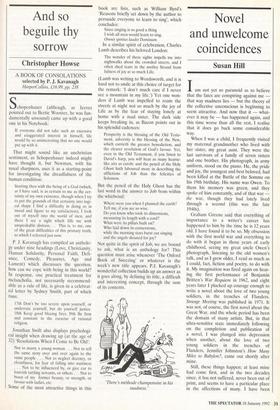And so beguile thy sorrow
Christopher Howse
A BOOK OF CONSOLATIONS selected by P. J. Kavanagh HarperCollins, £16.99, pp. 238 Schopenhauer (although, as Jeeves pointed out to Bertie Wooster, he was fun- damentally unsound) came up with a good one in his Notebook:
If everyone did not take such an excessive and exaggerated interest in himself, life would be so uninteresting that no one would put up with it.
That might sound like an unchristian sentiment, as Schopenhauer indeed might have thought it, but Newman, with his usual sharpness, uses it as a starting-point for investigating the dreadfulness of the human condition:
Starting then with the being of a God (which, as I have said, is as certain to me as the cer- tainty of my own existence, though when I try to put the grounds of that certainty into logi- cal shape I find a difficulty in doing so in mood and figure to my satisfaction), I look out of myself into the world of men, and there I see a sight which fills me with unspeakable distress. . . This is, to me, one of the great difficulties of this primary truth, to which I referred just now.
P. J. Kavanagh has compiled an antholo- gy under nine headings (Love, Christianity, Human Solidarity, Personal Faith, Defi- ance, Comedy, Pleasures, Age and Lament) which discussses the question, how can we cope with being in this world? In response, one practical treatment for melancholia, not necessarily recommend- able as a rule of life, is given in a celebrat- ed letter by Sydney Smith, part of which runs:
17th Don't be too severe upon yourself, or underrate yourself, but do yourself justice. 18th Keep good blazing fires. 19th Be firm and constant in the exercise of rational religion.
Jonathan Swift also displays psychologi- cal insight when drawing up (at the age of 32) 'Resolutions When I Come to Be Old':
Not to marry a young woman . . . Not to tell the same story over and over again to the same people . . . Not to neglect decency, or cleanliness, for fear of falling into nastiness . . . Not to be influenced by, or give ear to knavish tattling servants, or others ... Not to boast of my former beauty, or strength, or favour with ladies, etc.
Some of the most attractive things in this book are lists, such as William Byrd's 'Reasons briefly set down by the author to persuade everyone to learn to sing', which concludes:
Since singing is so good a thing I wish all men would learn to sing.
Omnis spiritus laudet Dominum.
In a similar spirit of celebration, Charles Lamb describes his beloved London:
The wonder of these sights impells me into nightwalks about the crowded streets, and I often shed tears in the motley Strand from fulness of joy at so much Life.
(Lamb was writing to Wordsworth, and it is hard not to smile at this choice of target for the remark: 'I don't much care if I never see a mountain in my life.') Yet one won- ders if Lamb was impelled to roam the streets at night not so much by the joy of Life as by the fear of staying lonely at home with a mad sister. The dark side keeps breaking in, as Bacon points out in his splendid cadences:
Prosperity is the blessing of the Old Testa- ment, adversity is the blessing of the New, which carrieth the greater benediction, and the clearer revelation of God's favour. Yet, even in the Old Testament, if you listen to David's harp, you will hear as many hearse- like airs as carols: and the pencil of the Holy Ghost hath laboured more in describing the afflictions of Job than the felicities of Solomon.
But the pencil of the Holy Ghost has the last word in the answer to Job from within the whirlwind:
Where were you when I planned the earth? Tell me, if you are so wise. Do you know who took its dimensions, measuring its length with a cord? What were its pillars built on? Who laid down its cornerstone, while the morning stars burst out singing and the angels shouted for joy?
Not quite in the spirit of Job, we are bound to ask, what is an anthology for? This question must arise whenever 'The Oxford Book of Sneezing' or whatever is the week's new title appears. P.J. Kavanagh's wonderful collection builds up an answer as it goes along, by defining its title, a difficult and interesting concept, through the sum of its contents.
'There's methode champenoise in his madness.'


















































 Previous page
Previous page